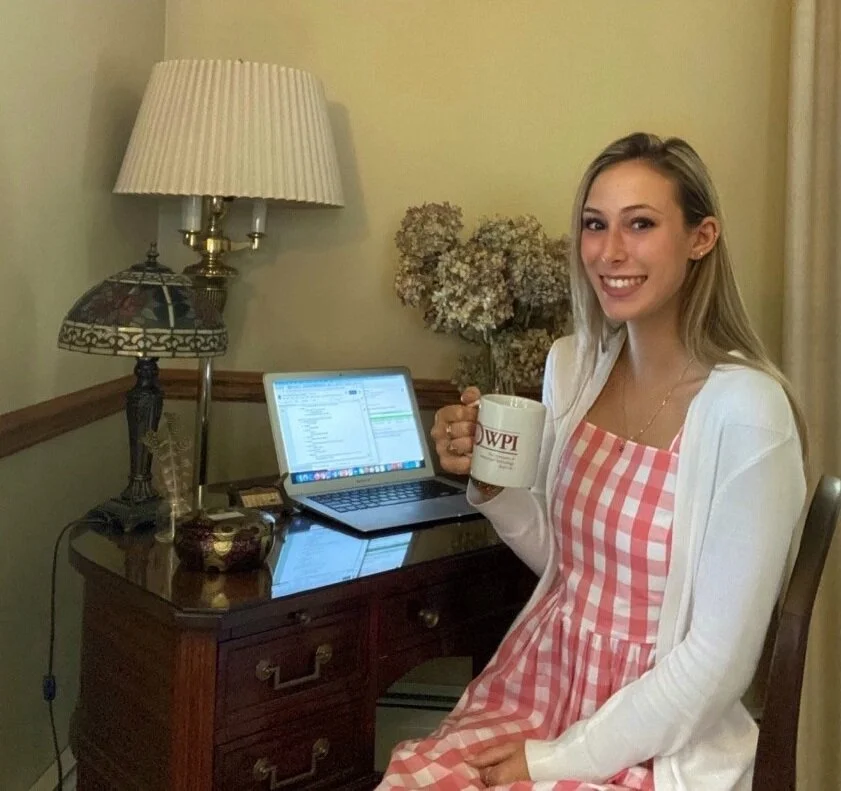Source: wpi.edu
PROMOTING SUSTAINABILITY FROM THE STARS
WPI aerospace major wins prestigious aerospace fellowship, plans to study sustainability in space once she graduates.
Julia Bigwood (WPI '21) working remotely at her internship with Bryce Space and Tech.
Julia Bigwood '21 has gone where no other WPI student has gone before—into the Matthew Isakowitz Fellowship Program.
She is the first WPI student to be appointed a Matthew Isakowitz Fellow, an internship and mentorship program for college juniors, seniors, and graduate students who are passionate about commercial spaceflight.
“This will be my first internship at an aerospace engineering company, so I’m really excited to apply what I’ve been learning in my classes here at WPI,” says Bigwood, an aerospace engineering major and astrophysics minor. “Through the fellowship, I’m hoping to get a better idea of what I’d like to focus on for a PhD program.”
Prior to the COVID-19 pandemic, fellows were scheduled to take part in a 10-12 week in-person summer internship at a commercial spaceflight company; however, due to health and safety concerns, some fellows are completing the internship remotely (others were able to complete their internship in person, depending on the company). Before starting the internship, fellows were paired with a mentor from the space industry for guidance on how to make the best of the internship experience and their future careers.
Bigwood's mentor was Suzi McBride, chief operations officer of Iridium Communications, who leads operations of the Iridium network, which includes its satellite constellations and ground gateways and terminals. Bigwood’s internship originally was to take place at an aerospace company (in McLean, Va.), where McBride previously worked; unfortunately, the pandemic forced the company into bankruptcy.
Instead, Bigwood is doing her internship remotely with Bryce Space and Tech, an analytics and engineering firm in Alexandria, Va., that works with space and satellite, cyber, and research and development clients. She is working on the company’s start-up space report, which includes recording new investments in start-up space companies worldwide, and analyzing investments and aerospace industry trends.
Regardless of the unexpected switch, Bigwood says she loves the internship so far, and it is something she always wanted to try. She’s just as excited to work with McBride, too.
“Where McBride has such a diverse background within the aerospace engineering field," she says, "I’m hoping to gain some insight into different aerospace options and what her experience has been.”
Bigwood is currently attending a virtual summit for networking opportunities to participate in different webinars on the aerospace field, and to digitally connect with other Matthew Isakowitz fellows.
Dazzled by astronomy from an early age, Julia Bigwood tips her cap to WPI’s Pre-Collegiate Outreach program for fueling her love of hands-on learning and aerospace engineering.
“As a kid, I grew up [in Westborough, Mass.] being a part of lots of pre-collegiate engineering exposure for women, such as Introduce A Girl to Engineering. So when it came down to finding a field where I could take a hands-on engineering approach to space problems and astronomy-related topics, I chose aerospace because it seemed like the best of both worlds.
Sue Sontgerath, director of Pre-Collegiate Outreach Programs, and Judy Nitsch ’75, Trustee Emerita, who focused on environmental sustainability during and after WPI, are two of my all-time favorite female mentors. They are a huge reason why I chose the engineering field, and they've been major figures in my life, especially through the amazing Pre-Collegiate Outreach programs.” –Julia Bigwood ’21
Reaching for the Stars to Help Earth
At the end of her fellowship in late summer, Bigwood hopes her experience will help her achieve her ultimate career goals: identifying better sustainability practices that will help the world. She says aerospace engineering plays a huge role in promoting sustainability and climate change awareness. “Satellites alone have allowed us to see the drastic change in Earth’s atmosphere over the past few years. I truly believe it is the answer to our climate crisis.”
Bigwood also recently looked at exoplanet detection methods in space during her astrophysics minor capstone, and says that sustainability is an issue in space travel, too. “Aerospace engineering allows us to develop new cutting-edge technology to help us grow crops in space—like on the International Space Station—and hopefully produce water and air as well.”
To Graduation, and Beyond
After Bigwood graduates next spring, she hopes to enroll in a PhD program to focus on sustainability relating to aerospace engineering, and eventually work with space technology to create products to sustain life in space, such as water and air. Then, she hopes to work at a commercial spaceflight company, or even create her own startup.
She doesn’t stop there—Bigwood says her goals go even higher. “Eventually, I’d love to become an astronaut,” she says. “But just working in the aerospace engineering industry to promote sustainability is a dream job of mine.”
-By Jessica Messier
